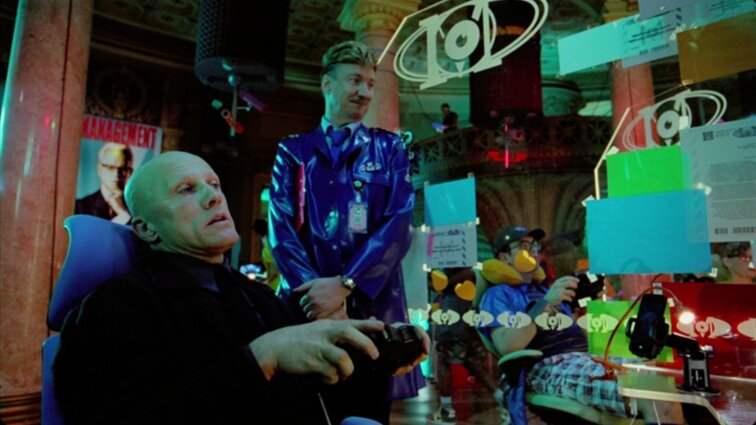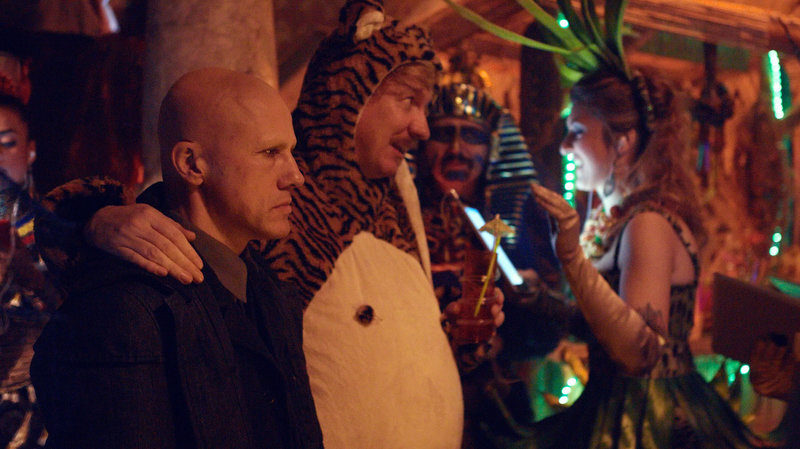Summary
Qohen is a singularly minded omni-phobic computer operator who believes that the meaning of his life is just a phone call away if only he can keep Management’s constant demands for the Zero Theorem Proof off his back.
My Thoughts
It saddens me, at the end of my Gilliam Gauntlet, to end up finishing with one of his least known and, in my opinion, worst films. It leaves me with many questions, however, and like some of his other lesser films such as “Tideland,” and might be what I would be most interested in picking the brain of one Terry Gilliam for answers. Alas, that will most likely never happen so I am left to muse alone. (see, I get your plight Qohen)
There isn’t a whole lot to the plot so I guess I will start with the character the film revolves around since that seems to be what the film is interested in. Qohen, when we meet him, is obsessed with two things. The first is a phone call that he is waiting for which he believes will give his life a meaning. The second is entity crunching. Sort of like number crunching but more advanced, done with computer terminals and user interfaces that look like mind-numbingly boring and frustrating video games of the puzzle variety.
The ‘plot’ of this film opens with a new idea from Qohen which he approaches his supervisor (David Thewlis, “Naked”) asking to be allowed to work from home since from Management’s perspective commute time is lost time and to him, Qohen, time away from home is time he might miss a potential call about his meaning of life crisis. He is granted his request and reassigned to work the Zero Theorem, a theoretical mathematical statement which must be verified, that existence is meaningless.
Along the way, he gets help, counseling, comfort, and friendship from a slew of characters ranging from a Computerized Psychotherapist, Management’s rebellious son, a Virtual Hooker with a real heart of gold, and his own Supervisor who failed to crack the Zero Theorem himself.
There really isn’t much more to the film than that. Every conversation feels the same. Every scene feels the same. The vector of this movie is going all in one direction till it ends in a resounding, “well, I guess that’s how it ends, huh?” There is no ebb and flow in the plot. You never feel like things have just turned for the better for Qohen nor do you ever feel like something really terrible has befallen him and has derailed his own plans
Plenty of other movies I love could be accused of the same thing but usually the thing that makes them palatable is a character you love, a plight you identify with, or a reassessing of a problem through various points of view. The problem here is that none of these elements cause the movie to rise up over its depiction of mundane soul searching. Why is this character so shallow to me? Why do the ups and downs of his life seem inconsequential? Why are the existential questions handled so clumsily as to feel like they are from a singular point of view and not many different ones looking at a larger picture? I don’t know.
Part of me feels like it must be a low budget at fault. Part feels like poor writing. In the end though, it doesn’t matter because I had to try watching this film three times to get through it and be sure I wasn’t missing something key that unlocked the film’s mysteries, something I’ve had to do with great films before now, and yet I feel no love for this movie at all, except maybe some creative production design. I’ve seen it more times than I cared for and won’t watch it again.
One can never be sure but this film feels like it was a chore for Gilliam. None of his trademark delight in mischievousness and play is to be found lurking in this near-future film.
I guess it did leave me with one positive feeling. It left me thankful that Terry Gilliam got to make “The Man Who Killed Don Quixote.”
What a tragedy it would have been had “Zero Theorem” been the last from a truly brilliant director.
Review Written By:







